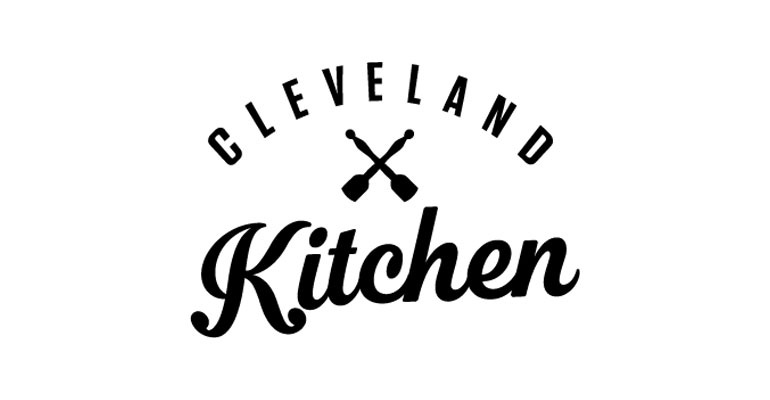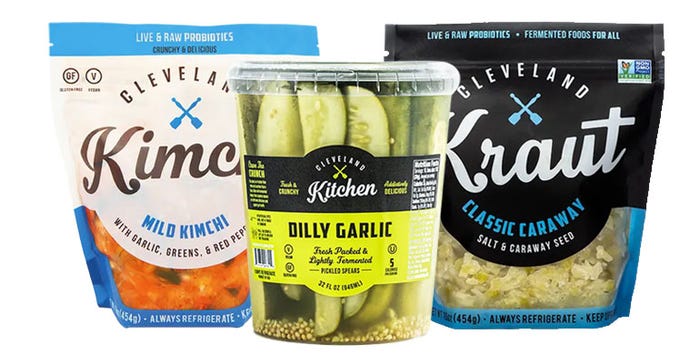The fast-growing fermented foods business quadruples capacity with a new automated plant as it captures experience and expertise of West Coast brand.
June 9, 2022

Cleveland Kitchen has made a name for itself as one of the fastest-growing businesses in the natural food industry with its kraut, kimchi, pickles, dressings and marinades.
With its acquisition of Sonoma Brinery, also known as Alexander Valley Gourmet LLC, and the building of a new, automated production plant, the brand can better serve West Coast retailers
Although the deal was publicly announced on Thursday, it closed on Feb. 25—the same day Cleveland Kitchen closed a Series A funding round of approximately $18 million, co-led by Amberstone, a venture capital firm focused on the CPG space, and CJ Group, a strategic partner based in Korea, with participation from Clover Vitality, a longtime partner.
"With this acquisition, we can leverage our combined strength in the fermentation space and create great products with an expanded customer base. We feel this is an incredible opportunity to take both brands to the next level thanks to our sales experience, marketing power and best-in-class fermentation processes," co-founder and CEO Drew Anderson says in a released statement. All Sonoma Brinery employees and its founder, Dave Ehreth, will join Cleveland Kitchen.
Cleveland Kitchen—which is headquartered, not surprisingly, in Cleveland, Ohio—collected funds from current investors the day before the closing, Anderson says, but the funds from Amberstone and CJ Group arrived between 7 and 9:15 a.m. the day they were purchasing Sonoma Brinery. The company has raised approximately $23 million in total funding, with $5 million raised prior to this recent round, he says.
“It was a tumultuous, exciting day. We saw the funds in our account and we immediately found a Chase Bank an hour away that would allow us to do wires,” Anderson says. “My CFO and I just set up shop and started wiring.” For hours, they wired money to the shareholders of Sonoma Brinery as well as other investors.
“It was very important because we had to fund the deal as well as the new plant,” Anderson says. Current investors, including Clover Vitality, came forward “to help us get the Santa Rosa plant locked up.”
“We immediately paid those investors off with the Series A,” he says.

Planning the purchase a year-long endeavor
During the spring of 2021, Cleveland Kitchen began building the plant in Santa Rosa, California, for the Sonoma Brinery team, which had been headquartered in a 10,000-square-foot plant in Healdsburg, California.
“We funded it with money we hadn’t quite raised yet, scraping by to get this brand new, small footprint but highly efficient, highly automated plant running,” Anderson says. The Healdsburg plant wasn’t really set up for manufacturing, as it needed more cold storage and loading docks, he explained.
Instead, Cleveland Kitchen converted a high-ceiling industrial space previously used for the wine industry, with state-of-the-art coolers and production line with cleaning, fermentation and offices. With more automation and less hands-on work, the 50 Sonoma Brinery employees are going to be able to produce “four to five times as much product and it’s going to be way easier," Anderson says.
“Balancing building a plant and doing a deal in tandem was stressful,” Anderson says. The company, with a total of 95 employees, plans to sell products under both the Cleveland Kitchen and Sonoma Brinery brands.
Growth through Walmart pushed Cleveland Kitchen forward
Cleveland Kitchen’s success at Walmart and ability to manufacture its product spurred the company's expansion and acquisition of Sonoma Brinery.
“This started by grabbing the opportunity Walmart gave us,” says Mac Anderson, co-founder and chief commercial officer at Cleveland Kitchen. “We like to vertically integrate, manufacture and go up the value chain to control our destiny, which definitely helped us achieve that 99% service through such a rocky period."
Cleveland Kitchen’s ability to hit a “99% service level into Walmart” for its in-stock rate and being “on time in full” was key to a successful and good partnership with Walmart, Anderson says. Walmart's national merchandising director was “incredibly thankful” for Cleveland Kitchen’s ability to hit that benchmark between 2020 and 2022 despite pandemic-related supply chain and labor difficulties.
“He mentioned to us that no one else in the category was doing this,” Anderson says.
The Walmart buyer also knew “a little bit” of Cleveland Kitchen’s product roadmap, a plan that included fresh, lightly fermented pickles. Anderson says the buyer asked if Cleveland Kitchen would “consider accelerating that plan.
“He asked us if we would consider accelerating that plan because a couple of his major suppliers were really struggling,” Anderson says.
That prompted Cleveland Kitchen to reach out to Dave Ehreth, founder and president of Alexander Valley Gourmet LLC in spring 2021.
“We gave him a buzz and asked if there was any way of joining forces,” Drew Anderson says. “And he said this is timely. He was looking for a way to step back, so we put together a deal and finally got it done in February, but it took a while.”
Last July, in the middle of the trying to close the deal, Cleveland Kitchen launched into 1,300 Walmart locations with its Dilly Garlic Chips and Pickle Spears and 1,500 stores with its kraut “to get enough volume going to start the line and get things rolling.”
Drew Anderson says Cleveland Kitchen sought a high-quality co-packer who could temporarily produce its recipe, as a stopgap, so it could focus on the acquisition of Sonoma Brinery while trying to scale at Walmart.
"That way we could focus on getting the deal done so we could have pickle manufacturing," Anderson says. "Because the margins just aren't there on the co-packing side. We quickly learned to have a sustainable pickle business with proper margins for growth, we had to own the manufacturing."
Next month, Cleveland Kitchen plans to expand its pickles to 3,000 Walmart locations nationally.
About the Author(s)
You May Also Like




